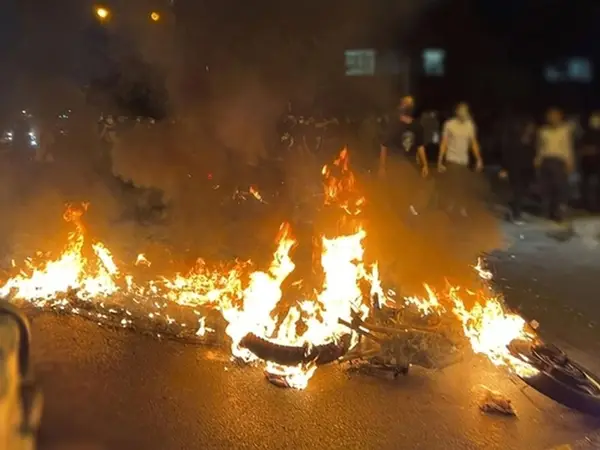Iran’s foreign minister Thursday accused Israel and Western intelligence agencies of trying to start a civil war and divide Iran, as protests raged across the country.
"Various security services, Israel and some Western politicians who have made plans for civil war, destruction and the disintegration of Iran, should know that Iran is not Libya or Sudan," Hossein Amir-Abdollahian tweeted, adding that Iranians would not fall for such plans.
Protests intensified this week when anonymous activists called for three days of demonstrations to commemorate the death of at least 1,500 people who were killed in November 2019 in nationwide protests. The overwhelming public response to their call on Tuesday and Wednesday and the death of more people resulted in a new announcement to extend the demonstration until November 21.
State media presented the death of seven people during protests in the southwestern city of Izeh on Wednesday as a “terrorist attack” and drummed up the narrative that antigovernment protests were being inflamed and partly controlled by “enemies”.
Iranian officials have been insisting on this narrative for weeks, as popular protests that began with the killing of Mahsa Amini in ‘hijab police’ custody have turned into a full-fledged anti-regime movement.
So far, the authorities have not presented any tangible evidence except detaining some foreigners, possibly dual nationals, claiming they were foreign intelligence agents. The government has not revealed any names, but France acknowledged last week that two more of its citizens were arrested in Iran.
What happened in Izeh is not clear. Armed men opened fire on people in the streets, killing seven adults and children. The government says “terrorists” riding on motorcycles opened fire, but it could well have been plainclothes agents and vigilantes the government uses against protesters. They often appear on motorcycles, beat people in the streets and shoot at protesters.
Reports say at least 8 people were killed in Esfahan Province on November 15 and 16, and government media alleges that these were also attacks by terrorists, although Esfahan is in the center of the country and far from regions where infiltration would be relatively easy.
Fars news website affiliated with the Revolutionary Guard squarely blamed “separatists” on Thursday, as a last-ditch argument the Islamic Republic has used before to justify violence against protesters and spread fear among Iranians who are overwhelmingly committed to the territorial integrity of the country.
So far, security forces have killed around 350 people and detained up to 15,000 without being able to control the uprising. In fat, protests this week have been the most intense since the uprising began in September.
In fact, people of various ethnicities and religious backgrounds have been remarkably united in the past two months, from the Sunni majority in Zahedan, close to the Pakistani border to the capital Tehran and Kurdish and Arab regions in the west and southwest. Protesters routinely chant slogans such as, “From Zahedan to Tehran, My life for Iran.”
The killing of Mahsa Amini, who was a Kurdish woman, triggered the nationwide protests because most Iranians regard all ethnic groups as part of a diverse country.
